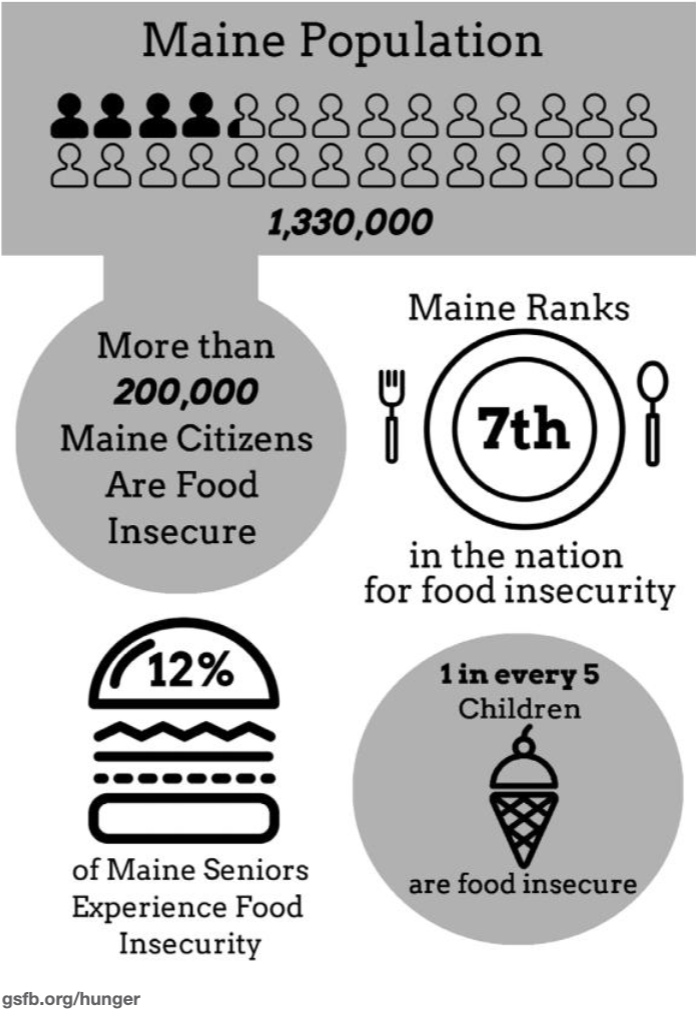Sarah O’Connor, Staff Writer
Maine’s food insecurity situation has gotten worse in the past three years. The number of food insecure Mainers has decreased from 2014 to 2015, but Maine’s ranking nationwide has moved up to 7th in the nation, according to the U.S. Department of Agriculture (USDA).
Maine ranks #7 in the nation and #1 in New England for food insecurity, according to the USDA. They estimate that 16.4 percent of households or more than 200,000 people in a state of 1.33 million people. Additionally, one in every five children are food insecure, making Maine #16 in the nation and #1 in New England for child food insecurity, according to Feeding America.
The USDA defines food insecurity as not having access to enough food to ensure adequate nutrition. They reported in September 2016 that 42 million Americans are food insecure.
“The USDA defines food insecurity as limited or uncertain access to adequate food — a situation that will often result in hunger,” Matthew Hoffman said, a food studies minor at USM. “Hunger is a physical condition, food insecurity is a social and economic condition. A person on the street with no money who has just found or been given a sandwich might not be hungry at the moment, but they are still ‘food insecure,’ since they don’t know where their next meal is coming from.”
The reasons for food insecurity are hard to pin down. Explanations for food insecurity don’t shed light on the truth of people’s experiences. They can stem from rates of food, divorce, crime and more, following certain patterns that vary over time and place.
“It is very common in the U.S. of course to look for reasons to blame people for whatever happens to them,” Hoffman said, “which is easy to do since most people’s fates are in some way connected to their actions, choices, or dispositions — however similar these may be to those of other people with completely different fates.”
Even so, Hoffman attributed two of the most influential reasons for food insecurity to low wages and state-created barriers to participation in federally-funded assistance programs. Hoffman noted that one third of Maine’s workforce cannot support themselves with their wage. According to the Good Shepherd Food Bank, 37 percent of Maine’s food insecure population does not qualify for public assistance. Instead, they must rely on charity supplied food.
Food insecurity does not just affect families, children and elderly people, but peers at USM and college students across the nation as well.
Matthew Walsh of the Portland Press Herald wrote, “Feeding America found that 49.3 percent of the college students it serves reported having to choose between food and educational expenses such as books, tuition and housing.”
At colleges in Maine, such as USM and University of Maine Orono, credit unions are there to assist students. In the community, the Good Shepherd Food Bank does a lot to help people in need. For every dollar donated, they distribute four meals to hungry people in Maine. The bank relies on the help from over 200 food donors like supermarkets and wholesalers. They provide to more than 178,000 Mainers each year. In 2015, they distributed 23 million pounds of food to local agencies in all 16 counties in Maine, according to the bank’s website.
The Good Shepherd Food Bank has teamed up with fellow local organization Preble Street to provide immediate relief through programs, research and advocacy.
“Their joint report, Hunger Pains, which came out last Feb., provides an excellent overview of the scope and causes of food insecurity in Maine,” Hoffman said. “Both of these organizations are collaborating with the Food Studies Program at USM to host a food policy forum on March 30, as well as gubernatorial candidate debates in April.”
The food policy forum is still in the planning stages, according to Hoffman. The forum will take place in Portland at Glickman’s University Events Room (UER) from 10 a.m. to 4 p.m.
Additionally, the Hunger Pains report can be found on the Great Shepherd Food Bank website.
To help the food insecurity situation in Maine, people can donate money, food or time to the Good Shepherd Food Bank, Preble Street and local soup kitchens, food pantries, neighborhood centers and homeless shelters. Freshman core classes volunteered at the Salvation Army with Wayside Food in Portland, and served meals to food insecure individuals. Any students can volunteer here as well, as they serve two meals a deal, almost every day.

